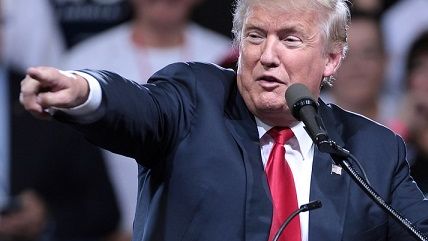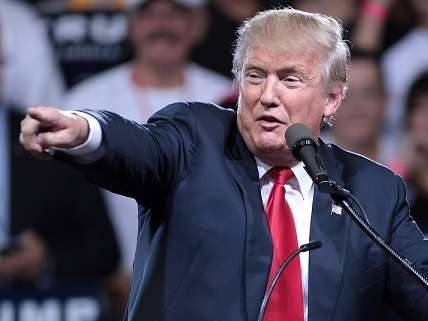Donald Trump's 'Wildcard' Foreign Policy Bearing Fruit?
Trump is "asking a lot of unfamiliar questions."


"Is Donald Trump a "freewheeling" "madman"? While Trump challenged foreign policy norms on the campaign trail, not holding back on attacking the George W. Bush legacy, he was hardly a non-interventionist—often complaining that the United States was not reimbursed for its security commitments and military actions around the world. Trump wants to make a deal. So far he's something of a wildcard.
Since becoming president-elect, Trump has made a number of moves that have rattled the foreign policy establishment, although his cabinet picks were not one of them. Rex Tillerson, his secretary of state nominee, was reportedly initially suggested by Bob Gates, the former Bush and Obama administration defense secretary, and backed by Condoleezza Rice, Bush's former national security advisor and secretary of state, both of whom run a consulting firm that represents ExxonMobil, where Tillerson is CEO. Former President Bush called Sen. Bob Corker (R-Tenn.), the chair of the Senate Foreign Relations Committee, where the nomination hearings will be heard, with "effusive" praise, and former Vice President Dick Cheney also backed Tillerson.
Henry Kissinger, former Richard Nixon and Gerald Ford secretary of state, meanwhile, was cautiously optimistic about Trump in a Face the Nation interview, telling John Dickerson Trump, "a phenomenon that foreign countries haven't seen," had the "possibility of going down in history as a very considerable president" because of the perception around the world that Obama "basically withdrew America from international politics" and because Trump was "asking a lot of unfamiliar questions."
The Washington Post's David Ignatius asks whether "Trump's freewheeling foreign policy could have its benefits," pointing to the "useful ambiguity and negotiating room" Trump created with the congratulatory phone call he took from the president of Taiwan. China captured an unmanned navy drone in the South China Sea, where China has been building military facilities on artificial structures, which was returned. Trump later tweeted the U.S. should "tell China that we don't want the drone they stole back.- let them keep it!" On Fox News Sunday last week, he asked why the U.S. ought to defer to China on relations with Taiwan and the One China policy, which Kissinger helped construct.
At the Washington Post, James Hohmann suggests Trump is following Nixon's "madman theory" on foreign policy, also pointing to Trump's approach to China as bearing some fruit, calling it "the first vindication of this approach." Since the election, Trump has re-affirmed U.S. security commitments to NATO and to countries like South Korea. The European Union invited Trump to a summit in Europe at his earliest convenience as soon as he was elected, and a NATO summit early next year in Brussels ought to be one of the first venues for Trump to demonstrate what's he meant by wanting to cut a deal, and whether he's ready to de-escalate American security commitments or whether he intends to continue a bipartisan foreign policy that sees America as an indispensable nation that must be involved everywhere.


Show Comments (100)